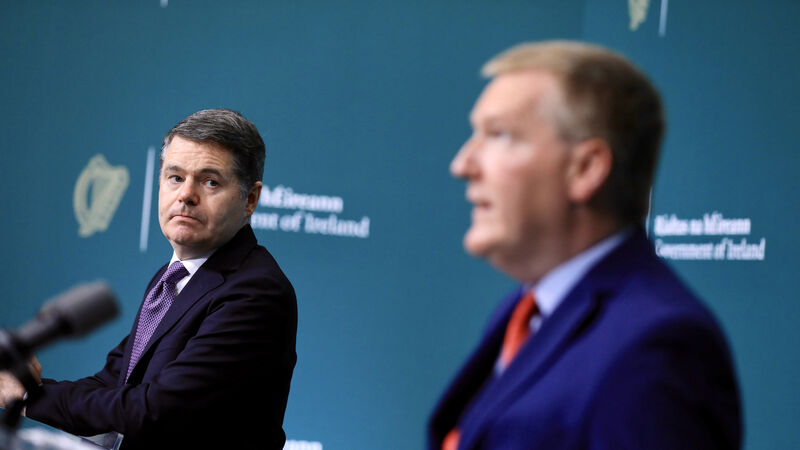Ireland's economy has proved remarkably resilient to Covid

Minister for Finance Paschal Donohoe and Minister for Public Expenditure and Reform Michael McGrath will prepare a budget against an economic backdrop that has improved over the past six weeks. Picture: Julian Behal
The Ministers for Finance and for Public Expenditure and Reform will present their budgets on Tuesday afternoon, against an economic backdrop that is much better than could have been hoped for even six weeks ago.
This is not to downplay in any way the very serious impact of coronavirus and the restrictions on our personal lives and business activities. However, the Irish economy has proved to be remarkably resilient.
Tax receipts, contrary to expectations, have remained relatively robust. Developments in the past ten days suggest that some form of Brexit deal, however limited, may now be on the cards. This would significantly limit the harm to the Irish economy of the trading disruption with the UK.
Even last week's ratification of Mairead McGuinness as the EU Commissioner is a help. Acknowledging the difference between having Irish influence and having influence for Ireland, financial services is one of the few areas where the EU single market for services is effective. This appointment may prove to be a reasonable trade-off for losing Phil Hogan as Commissioner in charge of EU trade policy.
We tend to evaluate the Budget on what it does for people's take-home pay and spending power, however minor those changes are. Tuesday's budget must be judged, not in terms of euros per week, but in terms of billions of euros next year – the amount which our government is willing to borrow to reinvest into the Irish economy by way of wage supports, social welfare supports for those who have lost their jobs, and retraining and reskilling for those whose jobs have disappeared permanently.
Such borrowing is sustainable as long as it is targeted. The ministers should also be wary of seeking to levy any significant new taxes on Irish citizens and businesses that have delivered well in 2020 in terms of tax yield. The cliché of killing the goose that laid the golden egg is apt.
An inevitable consequence of additional state supports is that businesses will have to prepare for additional regulation in 2021. For example, tax clearance certificates used only be needed for businesses in the licensed trades or businesses wishing to undertake government contracts. They are now needed by all businesses claiming pandemic supports like the employer wage subsidy scheme. Brexit will also bring additional regulation and registering for an EORI number to trade outside the EU is a sensible move for many Irish industries, even if current levels of trade with the UK are not particularly significant.
Irish business must also get used to the idea of trading with more scrutiny and less privacy. Those who benefit from pandemic supports will find themselves listed on Revenue and perhaps other government websites over time. Such lists already exist for some tax reliefs but what was once unusual will become more commonplace as the influence of government gets bigger through the pandemic. It is safe to assume that increased scrutiny and publicity will persist long after Covid-19 has become a bad memory.
The last time the country was in recession, we tried to tax our way out of it. That resulted in persistent government deficits and austerity policies for many years. The real test on Tuesday will be whether government can avoid this trap this time round by borrowing short-term to get the economy back on an even keel for when the pandemic recedes.
Brian Keegan is Director of Public Policy at Chartered Accountants Ireland



